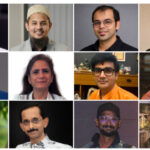1. Can you provide an overview of your book and how it addresses key challenges in the world today?
The core theme of Hinduism – The Technology for Joyous Living revolves around the idea that Hinduism is not just a religious belief system but a well-structured, scientific technology for achieving inner peace, self-mastery, and a balanced, fulfilling life. The book presents Hinduism as a practical framework that integrates spiritual wisdom with everyday living, offering tools and techniques that help individuals navigate modern challenges with clarity, resilience, and purpose.
Essence of the Book
At its heart, this book explores how Hindu philosophy provides a systematic approach to personal transformation and societal well-being. It highlights the practical application of Hindu principles such as:
- Self-Discipline and Ethical Living – The book delves into how concepts like Dharma (righteous duty), Karma (cause and effect), and Yamas & Niyamas (ethical guidelines) serve as foundational tools for achieving harmony in personal and professional life.
- Mindfulness, Meditation, and Devotion – By examining the role of Dhyana (meditation), Prarthana (prayer), and Bhakti (devotion), the book explains how these practices lead to mental clarity, emotional stability, and spiritual fulfillment.
- Science and Spirituality Integration – One of the key themes is the correlation between ancient Hindu wisdom and modern scientific discoveries in neuroscience, quantum physics, and psychology. The book presents Hinduism not as blind faith but as an experiential science of consciousness.
- Balancing Material and Spiritual Life – The book emphasizes that true happiness comes from integrating spiritual wisdom with practical action, allowing individuals to succeed in worldly pursuits while staying anchored in inner peace.
- A Guide to Societal Transformation – Beyond personal growth, the book envisions a larger goal—creating a society rooted in integrity, self-awareness, and collective progress. It highlights how individuals, by mastering themselves, can contribute meaningfully to their communities and the nation.
Hinduism – The Technology for Joyous Living is a call to action for anyone seeking a deeper understanding of life’s purpose. It is designed for seekers, professionals, students, and leaders who wish to align their lives with time-tested wisdom while remaining effective in the modern world. The book is a transformative guide that empowers individuals to harness the scientific and spiritual power of Hinduism to lead a joyous, meaningful, and successful life.
2. What inspired you to write this book, and what specific expertise or experiences do you bring to the subject matter?
As the author of Hinduism – The Technology for Joyous Living, my inspiration for writing this book stemmed from a deep realization that Hinduism is not just a religion but a well-structured science of life. Over the years, I have observed that while Hindu spiritual wisdom holds immense value, it is often misunderstood, misrepresented, or seen as mere ritualistic practice. Many people, both within and outside the Hindu community, struggle to connect with its profound teachings in a way that is practical and applicable to modern life.
I wanted to bridge this gap by presenting Hinduism as a systematic and scientific approach to achieving happiness, inner peace, and holistic well-being. My journey of over four decades in spiritual exploration, combined with my experience as a social worker and transformation mentor, has reinforced my belief that Hinduism offers concrete, time-tested methods for self-mastery, ethical living, and social responsibility.
This book was born out of my desire to translate these timeless teachings into a structured, easy-to-understand format that can be applied in daily life. By integrating Hindu philosophy with modern psychology, neuroscience, and contemporary challenges, I aimed to provide a practical guide for individuals seeking personal growth, mental clarity, and a meaningful existence.
Ultimately, Hinduism – The Technology for Joyous Living is an effort to empower readers with the knowledge and tools necessary to unlock their highest potential and contribute positively to society. It is my hope that this book serves as a transformative guide, helping people navigate life’s complexities with wisdom, resilience, and a sense of purpose.
3. Could you share some of the most valuable insights or takeaways that readers can expect from your book?
Young readers stand to gain immense benefits from Hinduism – The Technology for Joyous Living, as it presents the timeless wisdom of Hinduism in a practical, logical, and relatable manner. In today’s fast-paced world, where stress, confusion, and uncertainty often dominate young minds, this book serves as a powerful guide to achieving mental clarity, emotional resilience, and a purposeful life.
Key Benefits for Young Readers
- Clarity in Life’s Purpose and Direction
- The book helps young readers understand their role in life through Dharma (righteous duty) and Karma (law of action and consequence).
- It provides insights on how to make conscious, ethical choices that lead to long-term success and fulfillment.
- Stress Management and Emotional Resilience
- Practical techniques from Hindu philosophy, such as meditation (Dhyana), prayer (Prarthana), and mindfulness, help manage anxiety, stress, and distractions.
- It teaches how to develop inner peace amidst academic, professional, and personal pressures.
- Enhancing Focus and Productivity
- The book introduces structured methods to harness the power of the mind, improving concentration, discipline, and efficiency.
- Lessons from Hindu traditions on self-mastery and self-control help young readers build habits that enhance personal and professional growth.
- Bridging Science and Spirituality
- It connects Hindu wisdom with modern scientific discoveries in neuroscience, psychology, and quantum physics, making spirituality relevant to young minds.
- The book demystifies Hindu concepts by explaining their logical, scientific basis, removing misconceptions and making it accessible to rational thinkers.
- Balancing Material and Spiritual Success
- Young readers often struggle between ambition and inner peace; this book provides a structured way to integrate both.
- It teaches how to achieve worldly success while staying spiritually grounded, preventing burnout and dissatisfaction.
- Building Strong Character and Leadership
- Hinduism’s ethical principles (Yamas & Niyamas, Bhagavad Gita’s teachings) serve as a guide to developing integrity, leadership, and social responsibility.
- It encourages young minds to lead by example, fostering a value-driven, responsible, and impactful life.
- Empowerment to Face Challenges
- By understanding the deeper aspects of Hinduism, young readers develop a resilient mindset capable of handling life’s uncertainties.
- The book instils confidence by showing how self-discipline, devotion, and wisdom can turn obstacles into opportunities.
For young readers, Hinduism – The Technology for Joyous Living is more than just a book; it is a life manual that equips them with the tools to thrive in a complex world. By integrating ancient wisdom with modern relevance, it empowers them to cultivate self-awareness, achieve personal success, and contribute meaningfully to society. This book is an essential read for anyone seeking a life of joy, purpose, and fulfillment.
Hinduism – The Technology for Joyous Living is not just a book—it is a blueprint for a balanced, purposeful, and fulfilling life. It redefines Hinduism not as a mere religious tradition but as a structured, scientific, and practical system for achieving inner peace, self-mastery, and societal well-being.
4. Can you highlight any case studies or real-world examples from your book that illustrate the principles you discuss?
The book may share case studies of individuals or communities who have embraced Hindu principles and transformed their lives. For example, it might discuss how a person struggling with stress or materialism found peace by practicing meditation, adopting a more ethical lifestyle, or aligning their actions with their deeper purpose (dharma). Real-world examples of how Hindu concepts like non-attachment and mindfulness have been applied successfully in daily life or corporate environments might also be highlighted.
5. Are there any particular challenges you encountered while writing this book, and how did you overcome them?
Writing a book that bridges ancient spiritual knowledge and modern challenges may present challenges like:
- Ensuring cultural sensitivity: Balancing the authenticity of Hindu teachings while making them relatable to a global audience.
- Complexity of the subject: Hinduism is vast and multifaceted; simplifying its teachings without losing depth might have been a difficult task.
- Modern Misinterpretations: Addressing misconceptions about Hinduism and ensuring the message remains clear and true to tradition could have been a concern. To overcome these, the author might have worked with scholars, spiritual guides, and practitioners to ensure accuracy and relevance.
6. What do you hope readers will gain from reading your book, and how do you envision it making a positive impact on their lives?
The author hopes that readers will gain practical tools to improve their mental, emotional, and spiritual well-being. By applying the principles discussed in the book, readers might experience a greater sense of purpose, peace, and joy in their lives. The book could also encourage a deeper understanding of the interconnectedness of all life, fostering compassion, sustainability, and ethical living. The author envisions it as a guide that helps individuals live more fulfilling and harmonious lives.
7. In a rapidly changing environment, how does your book stay relevant and adaptable for readers over time?
In a world that is constantly changing, the timeless nature of the teachings of Hinduism provides the book with a natural adaptability. Hindu philosophy emphasizes inner transformation, which is independent of external circumstances. As new global challenges emerge, such as technological advances or environmental crises, the spiritual practices and teachings in the book—such as mindfulness, self-awareness, and ethical living—remain relevant. The adaptability of these practices allows them to address modern issues, from mental health to environmental sustainability, ensuring the book’s relevance for future generations.
Get your copy today on Amazon and embark on a journey of self-discovery!
















